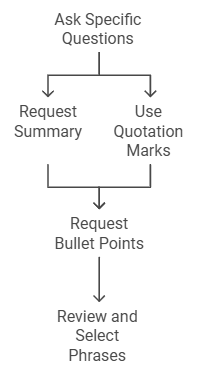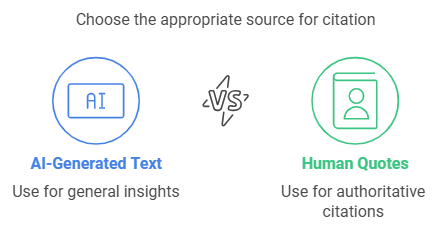Introduction
In the world of content creation, research, and professional writing, direct quotes are often an essential element. Whether you’re drafting an essay, a blog post, or a report, adding credible quotes from reliable sources can enhance the quality and authenticity of your work. One tool that has gained significant traction in this domain is ChatGPT, an advanced AI language model developed by OpenAI. But how can you get direct quotes from ChatGPT? In this detailed guide, we’ll explore how you can extract, use, and apply direct quotes from ChatGPT effectively.
Meta description
Learn how to easily obtain direct quotes from ChatGPT with our complete guide. Discover techniques for asking precise questions, summarizing responses, and formatting quotes effectively to make the most of ChatGPT’s AI-generated insights.
How to Get Direct Quotes from ChatGPT: A Complete Guide
To get direct quotes from ChatGPT responses, you can follow these steps:
- Ask Specific Questions: Pose questions that prompt ChatGPT to provide straightforward, quotable answers. Try to phrase questions directly to get concise information.
- Request a Summary: If you’re covering a broad topic, you can ask ChatGPT to provide a summary or key takeaways. This often results in concise, quotable points.
- Use Quotation Marks: Indicate that you want a direct quote by saying something like, “Could you summarize that in a quote?” or “Please provide a concise quote on this.”
- Request Bullet Points: For lists or points, ask ChatGPT to deliver the information in bullet points. This structure can provide easy-to-quote sections.
- Review and Select Phrases: Since ChatGPT responses are text-based, you can copy parts of the response directly and format them as quotes if they meet your needs.

1. What Are Direct Quotes and Why Are They Important?
Before diving into how to get direct quotes from ChatGPT, let’s first define what direct quotes are and why they are important in writing.
- Definition of Direct Quotes: A direct quote is a word-for-word repetition of a statement made by someone or something. It is usually enclosed in quotation marks and cited with a source to validate its credibility.
- Importance of Direct Quotes: Direct quotes are valuable in writing as they provide authority and support to your arguments. They allow the reader to hear directly from experts, credible sources, or, in this case, an AI like ChatGPT. They also help enhance the credibility of your work by attributing certain information to its original creator.
2. Understanding ChatGPT’s Response Format
To get direct quotes from ChatGPT, it’s important to understand how the AI generates text and how its responses can be used in your writing.
- ChatGPT’s Knowledge Base: ChatGPT is trained on a vast array of data, including books, websites, and other publicly available content. It generates responses based on patterns and information it has been trained on up to a certain date.
- AI-Generated Text vs. Human Quotes: While ChatGPT is capable of generating insightful and contextually relevant content, it is not quoting from an existing specific source like a human expert would. Instead, it creates text based on its training data. Thus, while you can extract and use its responses, it’s important to know that these are not direct quotes from specific authors, researchers, or experts unless cited as such.

3. How to Get Direct Quotes from ChatGPT
Now that you understand the basics of quotes and ChatGPT, let’s walk through how you can obtain and use direct quotes from ChatGPT effectively.
- Ask Clear, Specific Questions: To get the most relevant and accurate quote from ChatGPT, ensure that your questions are precise. Instead of asking general questions, specify what you want in the response. For example:
- “Can you provide a detailed explanation of the importance of AI in modern education?”
- “Please summarize the benefits of remote work with specific examples.”
- Request a Quote: If you want a direct quote from ChatGPT, you can explicitly ask for it. For instance, you can say, “Can you give me a direct quote about the impact of social media on communication?” ChatGPT will then generate a response that you can quote directly, provided you frame the response accurately.
- Use the Generated Text as a Quote: Once ChatGPT responds to your query, you can use the generated text as a direct quote. Be sure to use quotation marks and attribute the source properly (ChatGPT in this case) in your writing. Example:
- ChatGPT says, “Artificial Intelligence has the potential to revolutionize the way we approach tasks across industries, offering improved efficiency and new possibilities.”
- Contextualize the Quote: When using a quote from ChatGPT, make sure to place it within the context of your writing. Explain why it’s relevant and how it supports your argument or point of view.
4. How to Cite ChatGPT’s Quotes
Since ChatGPT is an AI model and not a human author, citing its quotes requires a different approach than traditional sources. Here are some ways you can cite ChatGPT’s quotes:
- APA Style: In academic writing, the American Psychological Association (APA) style is commonly used. As there’s no established rule for citing AI models like ChatGPT, you can cite it like this:
- OpenAI. (Year). ChatGPT (Version). OpenAI. https://www.openai.com/chatgpt
- Example: OpenAI. (2024). ChatGPT (Version 4). OpenAI. https://www.openai.com/chatgpt
- MLA Style: For those using MLA formatting, a suggested citation might look like:
- OpenAI. ChatGPT. OpenAI, Year, https://www.openai.com/chatgpt.
- Example: OpenAI. ChatGPT. OpenAI, 2024, https://www.openai.com/chatgpt.
- General Attribution: In non-academic or informal contexts, simply attributing the quote to ChatGPT or OpenAI within your writing is often sufficient:
- Example: According to ChatGPT, “AI is transforming industries worldwide by automating tasks and generating insights.”
ChatGPT Unblocked: Unlocking Full Access to the AI Power
5. When Should You Avoid Using Direct Quotes from ChatGPT?
While ChatGPT is an incredibly useful tool for generating ideas, writing content, and even providing “quotes,” there are certain situations where it might not be the best source for direct quotations:
- When Accuracy is Critical: ChatGPT can provide useful insights, but it can also generate incorrect or outdated information. When working with complex, factual data or research, it’s best to rely on trusted human experts or peer-reviewed sources.
- When Citing Credible Sources is Required: If you’re writing an academic paper, a legal document, or any content where citation of authoritative sources is mandatory, using ChatGPT as a source may not be appropriate. In such cases, it’s better to find direct quotes from credible, verifiable sources.
- When Using the Quotes as Fact: Since ChatGPT does not quote directly from real-world sources but generates its responses from a combination of data it was trained on, treating its quotes as concrete facts without verification may lead to misinformation.
6. FAQs About Getting Direct Quotes from ChatGPT
- Can ChatGPT provide quotes from famous authors or specific sources?
- No, ChatGPT generates responses based on patterns it has learned from various data sources. While it can provide insights or paraphrased ideas, it does not quote specific authors or research unless explicitly stated in the model’s training data.
- How do I know if a quote from ChatGPT is accurate?
- While ChatGPT can provide helpful information, it’s essential to verify any factual claims from reputable, primary sources, especially for technical, scientific, or academic topics.
- Can I use ChatGPT’s quotes for academic papers?
- While you can use quotes from ChatGPT in academic writing, it’s best to use them as supplementary material and not as a primary source. Always verify the information and check your institution’s guidelines for citing AI tools.
- How can I improve the accuracy of ChatGPT’s quotes?
- To improve the quality of the generated quotes, ensure your queries are clear, specific, and well-structured. If you need a factual answer, always cross-check the response with trusted sources.
- Can I use ChatGPT for generating creative writing quotes?
- Yes! ChatGPT is excellent for generating creative writing quotes, ideas, and even dialogue for storytelling. Just be sure to add your unique style and voice to the content.
Conclusion
Getting direct quotes from ChatGPT can be an excellent way to add insights, ideas, or even creative content to your writing. While the quotes generated by ChatGPT can be incredibly useful for brainstorming, supporting arguments, or enhancing creativity, it’s crucial to understand how to use them appropriately. By asking the right questions, properly citing the AI, and verifying information when needed, you can effectively integrate ChatGPT into your writing process. Whether you are writing a blog post, academic paper, or creative piece, ChatGPT can serve as a valuable tool for generating useful quotes and content ideas.


